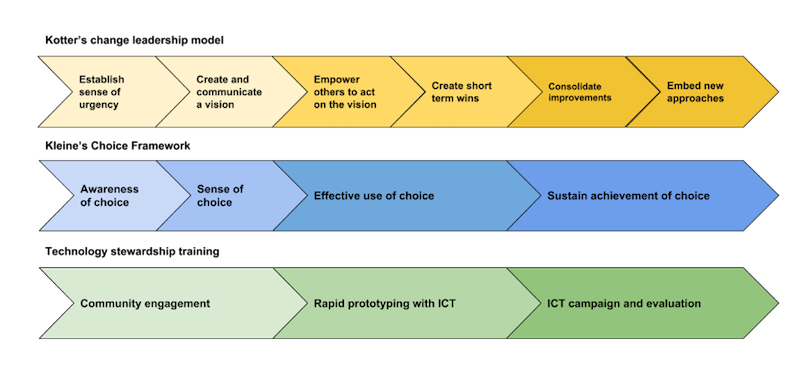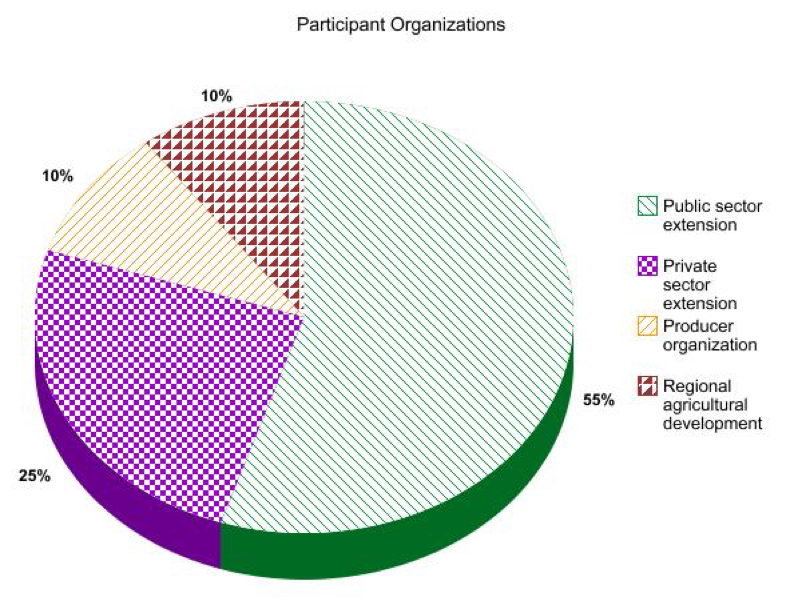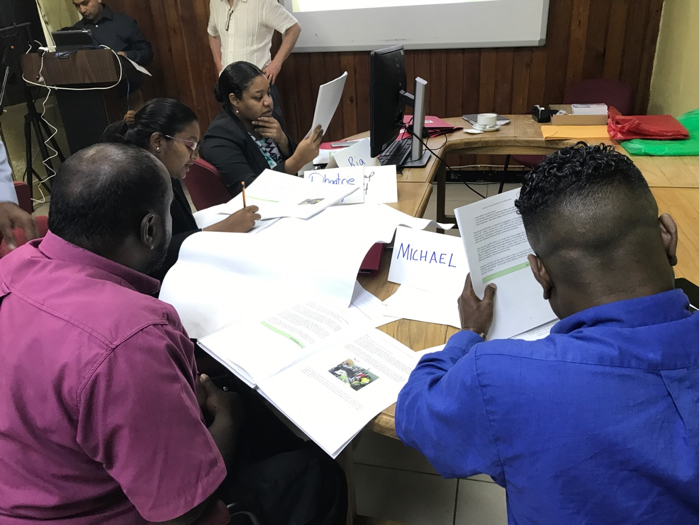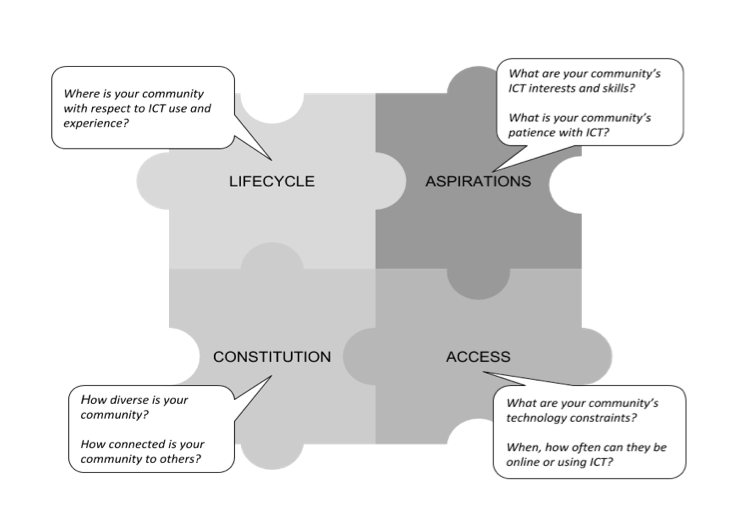
VOL. 5, No. 3
Abstract: Beginning in 2012, the University of Alberta in partnership with others has been undertaking participatory action research in Sri Lanka and, since 2017, in the Caribbean to foster inclusive innovation through a Joint Education and Training Initiative (JETI). The JETI is developing and testing a set of open educational resources on “technology stewardship” for resource-constrained organizations and communities in developing countries. The approach is a unique combination of social learning centred on communities of practice with action research methods intended to foster self-determination through improved “informational capabilities” as the primary outcome of development. In this article, we describe the learning objectives, design, observations, and initial outcomes of a pilot technology stewardship training course offered at the University of the West Indies in March 2018. Future plans and considerations for expanding technology stewardship training are discussed in the summary.
Keywords: ICT4D, communities of practice, technology stewardship, professional development, action research, Caribbean
A persistent challenge for researchers and educators working in Information and Communications Technologies for Development (ICT4D) has been the question of how to improve local impact through sustainable projects and initiatives. Despite ongoing efforts to enhance the socioeconomic impact of ICT4D research, Harris’ (2016) survey of 272 researchers in the field, concludes that “ICT4D research falls short of its potential to benefit the recipients of development programs” (p. 187), and that greater efforts in engagement are necessary to build closer relationships between researchers and users if these initiatives are to realize significant benefits for the communities involved. Meyer & Marais (2015) discuss the importance of clearly defining the intended outcome of community engaged research in ICT4D, and introduce the concept of sustained benefit to focus on “what [are] the benefits the project needs to deliver, what should be sustained and by whom.” Their model describes a tiered structure for this type of engagement, starting at a strategic level, where a governance structure must be in place to ensure alignment of goals and interests among parties through joint planning and coordinated decision making. At a tactical level, the project needs to take steps to build local capacity and ensure effective transfer of ownership of the project to the recipient community. At the operational level, communication processes need to be in place to sustain the ongoing benefits of the project through day-to-day operational support and training.
These ideas converge in the ICT4D literature under the term inclusive innovation. Inclusive innovation refers to “the means by which new goods and services are developed for and/or by those who have been excluded from the development mainstream” (Foster & Heeks 2013). It encompasses multiple facets of development, starting with access to affordable technology and extending outward to more ambitious engagement strategies that seek to enable excluded groups and communities to innovate for themselves through inclusive processes, structures, and policies.
Beginning in 2012, the University of Alberta in partnership with others has been undertaking participatory action research in Sri Lanka and, since 2017, in the Caribbean to foster inclusive innovation through a Joint Education and Training Initiative (JETI). The JETI is developing and testing a set of open educational resources on “technology stewardship” for resource-constrained organizations and communities. The approach is a unique combination of social learning centred on communities of practice (Wenger, 1998) with action research methods intended to foster self-determination through improved “informational capabilities” as the primary outcome of development (Gigler, 2011). In this article, we describe the learning objectives, design, observations, and initial outcomes of a pilot technology stewardship training course offered at the University of West Indies in March 2018 as part of an ongoing action research collaboration.
Technology stewardship is a multifaceted social practice described in the communities of practice literature:
Technology stewards are people with enough experience of the working of a community to understand its technology needs, and enough experience with or interest in technology to take leadership in addressing those needs. Stewarding typically includes selecting and configuring technology, as well as supporting its use in the practice of the community. (Wenger, et al., 2009, p. 25)
In other words, technology stewards are not simply IT support staff; they fulfill a vital community role in leading change through social learning. The role demands a range of competencies including effective community engagement, digital awareness/literacy, planning and coordination, as well as impact assessment and evaluation.
The technology steward is a leadership role that facilitates social learning to support ICT adoption and use in relation to the various activities and aspirations of a community of practice. Seen through the lens of Kleine’s Choice Framework (Kleine, 2013), the technology steward serves four primary responsibilities with regard to the adoption and use of ICTs in their community:

Figure 1: Technology Steward Training Mapped to Kotter’s Change Leadership Model and Kleine’s Choice Framework
In other words, technology stewards facilitate transformational social practice to help their communities be more self-determined in choosing how and when to use ICT in response to local needs and aspirations. As a form of change leadership, the technology steward’s responsibilities correspond with Kotter’s (2007) widely-cited management model (See Figure 1).
The open educational resources that we have been pioneering with partners in Sri Lanka and in the Caribbean are intended to introduce agricultural practitioners to the concept of technology stewardship and to provide accessible training and mentorship in a set of simplified action research competencies, including community engagement; ICT prototyping and testing; assessment and reporting methods. Initial findings from pilot studies suggest that technology stewardship can build local capacity for change leadership, while instilling confidence and skills needed to promote inclusive innovation with ICT more broadly (Gow, 2018; Jayathilake, et. al., 2017).
In March 2018 the JETI research team tested its latest version of the technology stewardship course with a group of agricultural and fisheries extension officers in Trinidad and Tobago. Designed as a two-day, short course, training took place at The University of the West Indies (UWI) St. Augustine Campus in collaboration with the Faculty of Food and Agriculture (FFA) and the Department of Agricultural Economics and Extension.
As part of its overall strategy to encourage ICT adoption among agricultural practitioners and rural communities, the FFA is now taking steps to develop a graduate diploma program in ICTs that will include technology stewardship training. The target population of the program is agriculture and rural development professionals, such as extension workers, community development agents, and field officers of private and nonprofit sectors who need to expand their knowledge and skills of new techniques and tools for community engagement and knowledge mobilization (Ganpat, et. al., 2016; Ganpat, et. al., 2014).
Two months prior to the course, the research team circulated a letter of interest to public and private sector extension organizations, regional development institutes, producer organizations, and community-based organizations. In the letter, we provided a link asking applicants to complete a pre-course survey online that provided the team with information about their professional roles, ICT experience and use, and interest in taking the course. We received 45 responses of interest and offered places to 20 applicants. In selecting participants, we considered representation of different organizations, professional roles, sectors and experience in using ICT tools and availability to participate in the full two days of course activities (Figure 2).

Figure 2: Course Participants by Organizational Type
Based on findings from the pre-course survey about social media use, the team created a WhatsApp group to coordinate communication with participants before, during, and after the course. participants were assigned to one of four affinity groups for the course, which was structured in three-hour sessions, and ran from 09:00-4:30 each day with breaks. With the exception of one individual, all participants completed all two days of the course (with the second day falling on a weekend).
participants were introduced to the concept of technology stewardship and, working in groups, were guided through a set of activities for identifying community needs, selecting appropriate ICTs, conducting pilot tests with the community, and evaluating results. At the end of the course, participants were awarded a certificate of completion. Follow-up interviews were conducted by phone/Skype several weeks after the course.
The course is designed around four sessions (modules), each building on the other toward a final capstone project. The first session provides an introduction to the overall approach using case-based learning to present basic concepts and examples to participants. participants were provided with a case study booklet that has been localized with examples set in Trinidad (Figure 3).

Figure 3: participants working in groups, with case study booklets
and course workbooks.
In the second session, participants continue to work in small groups and are asked to consider and choose a community of practice as a point of focus for the remaining activities. Using the workbook, participants conduct a problem-tree activity to identify priorities, issues or concerns for the community of practice. They then follow a set of procedures that help them to articulate a clear objective for conducting an ICT-based pilot study with the community of practice—referred to in the course material as a campaign (see Figure 4).
Following the principles of action research (Stringer, 2014) the campaign is a limited duration, exploratory intervention that stewards use to introduce and assess new (or unfamiliar) ICT-related social practices with their community members.

Figure 4: Results of community engagement exercise using a problem tree analysis (left) to develop a campaign objective (right); the objective informs the choice of ICT for the campaign.
Having articulated a campaign objective, participants are introduced to a series of activities that help them to identify ICT requirements, leading to a selection of an ICT tool or platform suitable for the campaign (see Figure 5). participants are encouraged to consider various social media platforms, as well as more specialized apps, depending on the need.
In the language of change leadership, community engagement is essential to create and communicate a vision for the community. This engagement process is important for the steward to help the community develop a clear sense of choice in how things are done, and how they might be done differently with respect to ICT use.
The course workbook includes a procedure for conducting “rapid prototyping and testing” of the ICT to test functionality and suitability with the community. From a change-leadership perspective, rapid and provisional deployment of the ICT platform creates an opportunity for a “short term win” by involving the community in the process of experimentation and maintains momentum. It supports the use of choice by offering community members an opportunity to test and comment on a new ICT application without having to make a long-term commitment to it.
As befits action research, the course material emphasizes the provisional nature of the campaign as a form of community learning, pointing out that the exercise of choice within an inclusive innovation context includes the decision not to adopt a particular ICT application, and to choose to continue to investigate other options (including those that are not ICT-based).

Figure 5: Diagram adapted from Wenger, et al., (2009) used as part of the activity to guide participants through an ICT readiness exercise for their community.
The final session leads participants through a campaign planning exercise that includes provision for collecting data at various stages that will contribute evidence to an evaluation of the pilot (see Figure 6). Evaluation is critically important to assess both formative and summative outcomes of the campaign and to be able to report results back to the community and organizational sponsors (e.g., government departments) that may be vital to providing support for ICT on an ongoing basis.
Campaign evaluation is an essential competency for the tech steward to be able to recognize the achievement of good choices with respect to ICT practices and to report those back to the community members. From a change leadership perspective, this step leads to the “consolidation of improvements” and can help facilitate the embedding of new practices, either through formal institutional policies or informal social conventions.

Figure 6: Campaign planning tool designed like a board game.
participants complete the final session by drafting an individual action plan (IAP) in which they select an activity that they will complete outside the classroom as a final capstone project. The IAP provides a number of options for participants based on the four training sessions, ranging from conducting a community engagement activity, completing a rapid prototyping exercise, or designing a campaign and evaluation plan. Some participants may choose to carry out more than one activity if they choose to do so. The capstone project is intended to be completed within two to three weeks following the classroom component of the course. participants then report back to the instructor and the rest of the cohort on their experience.
participants completed an evaluation form following the course, which indicated positive results overall. The course material was well received with 18 of 19 participants agreeing or strongly agreeing with the statement “the quality of the course content was excellent.” Most responded by indicating that it increased their knowledge in the subject area, that they were motivated to learn more about it, and would take additional courses in future if offered. Most also indicated they would recommend the course to others.
With respect to intended outcomes and the course material, we made several observations:
With respect to areas in need of further attention and improvement, the following observations were made by the research facilitators:
With respect to the Individual Action Plans (IAPs) submitted at the end of the course, 13 participants (76.5%) indicated they intended to undertake some type of post-course activity:
Some of the types of activities that participants indicated they would undertake included a range of ICT-related priorities:
During follow-up interviews carried out four weeks after the course about half of the participants stated they were “making progress” toward their goal in the IAP. In a number of cases, the participants were waiting for internal approval from their organizations before being able to proceed. Those that were not making progress in the IAP mentioned “time constraints and staffing shortage” or “heavy workload” as contributing factors.
In terms of fostering a community of practice of technology stewards among the cohort, all of the 12 participants contacted during the follow-up interviews indicated they intended to stay in contact with other members of the class. The WhatsApp group established for the course remained active as of July 2018 with occasional postings from participants, ranging from information about ICT apps to questions about crop diseases.
Results from the course suggest that the material is well received by participants and effective in achieving most of the intended learning outcomes. In-class observations and follow-up interviews with participants have highlighted a number of areas for further refinement with some notable areas for improvement:
These changes will be introduced into the course when we offer it at the University of Peradeniya Postgraduate Institute of Agriculture in Fall 2018, and hopefully again in the Caribbean with UWI in 2019. The team is also actively looking for other countries in which to offer the course through partnerships with other educational and training organizations.
We anticipate the material will be made available more widely as an open educational resource sometime in the near future after we have completed our testing phase. Moreover, we believe that technology stewardship training can be applied beyond the agricultural context to serve other communities of practice, including those in health, education, rural development, and government.
Foster, C. & R. Heeks (2013). Conceptualising Inclusive Innovation: Modifying Systems of Innovation Frameworks to Understand Diffusion of New Technology to Low-Income Consumers. Eur J Dev Res, 25(3): 333-355.
Ganpat, W. G., Ramjattan, J., & Strong, R. (2016). Factors Influencing Self-Efficacy and Adoption of ICT Dissemination Tools by New Extension Officers. Journal of International Agricultural and Extension Education, 23(1). doi:10.5191/jiaee.2016.23106
Gigler, B.-S. (2011). Informational capabilities: The missing link for the impact of ICT on development. Retrieved from SSRN website: http://dx.doi.org/10.2139/ssrn.2191594
Gow, G. (2018). Introducing a Technology Stewardship Model to Encourage ICT Adoption in Agricultural Communities of Practice: Reflections on a Canada/Sri Lanka Partnership Project. In R. Duncombe (Ed.), Digital technologies for agricultural and rural development in the Global South (pp. 43-53). Boston: CABI.
Gow, G. A., & Waidyanatha, N. (2017). Fostering Technology Stewardship Approach to Promote Knowledge Sharing among Farming Communities in Sri Lanka. Tropical Agricultural Research, 28(3), 238–246.
Harris, R. W. (2016). How ICT4D Research Fails the Poor. Information Technology for Development, 22(1), 177-192.
Jayathilake, H. A. C. K., Jayasinghe-Mudalige, U. K., Perera, L. D. R. D.,
Kleine, D. (2013). Technologies of choice? ICTs, development, and the capabilities approach. Cambridge, Massachusetts, MIT Press.
Kotter, J. P. (2007, January). Leading Change: Why Transformation Efforts Fail. Harvard Business Review, 96-103.
Meyer, I., & Marais, M. (2015). Design for Sustainability: Countering the Drivers of Unsustainability in Development Projects. The Journal of Community Informatics, 11(3).
Stringer, E. T. (2014). Action research (4th ed.). London: SAGE.
Strong, R., Ganpat, W., Harder, A., Irby, T. L., & Lindner, J. R. (2014). Exploring the Use of Information Communication Technologies by Selected Caribbean Extension Officers. The Journal of Agricultural Education and Extension, 20(5), 485-495. doi:10.1080/1389224X.2014.927373
Wenger, E., White, N., & Smith, J. D. (2009). Digital habitats: Stewarding technology for communities. Portland, CPSquare.
Wenger, E., McDermott, R., & Snyder, W. (2002). Cultivating communities of practice. Boston: Harvard Business School Press.
Wenger, E. (1998). Communities of practice: Learning, meaning, identity. Cambridge, MA: Cambridge University Press.
Authors
Gordon A. Gow is Associate Professor and Academic Director of the Master of Arts in Communications and Technology (MACT) program at the University of Alberta. He has been involved in international action research projects for over a decade, with an interest in building local capacity for innovation with digital ICTs. Email: ggow@ualberta.ca
Ataharul Chowdhury is Assistant Professor of the Capacity Development and Extension Program at the University of Guelph. Over the last decade, he has contributed to international and regional collaborative initiatives in thematic areas, such as advisory and outreach services, ICT and new media, participatory action research, and video for development. Email: ataharul.chowdhury@uoguelph.ca
Wayne Ganpat is Dean of the Faculty of Food and Agriculture at the University of the West Indies, Trinidad. Dr. Ganpat’s specialty is Agricultural Extension and Communications. He previously served as Director of Extension services in the Government of Trinidad for 30 years. Email: Wayne.Ganpat@sta.uwi.edu
Jeet Ramjattan is an Agricultural Extension Officer and PhD student in Agricultural Extension at the University of the West Indies. He has worked in collaboration with research and NGO partnering institutions such as GEF, FAO, CABI, CARDI, and IICA in sustainable development and community-based projects, such as Farmer Field Schools, Plant Clinics and IPM over the past 20 years. jeetramjattan@gmail.com
Cite this paper as: Gow, G. A., Chowdury, A., Ganpat, W., & Ramjattan, J. (2018). Enhancing ICT Adoption and Use through Change Leadership: Technology Stewardship Training for Caribbean Agricultural Communities of Practice. Journal of Learning for Development, 5(3), 296-307.